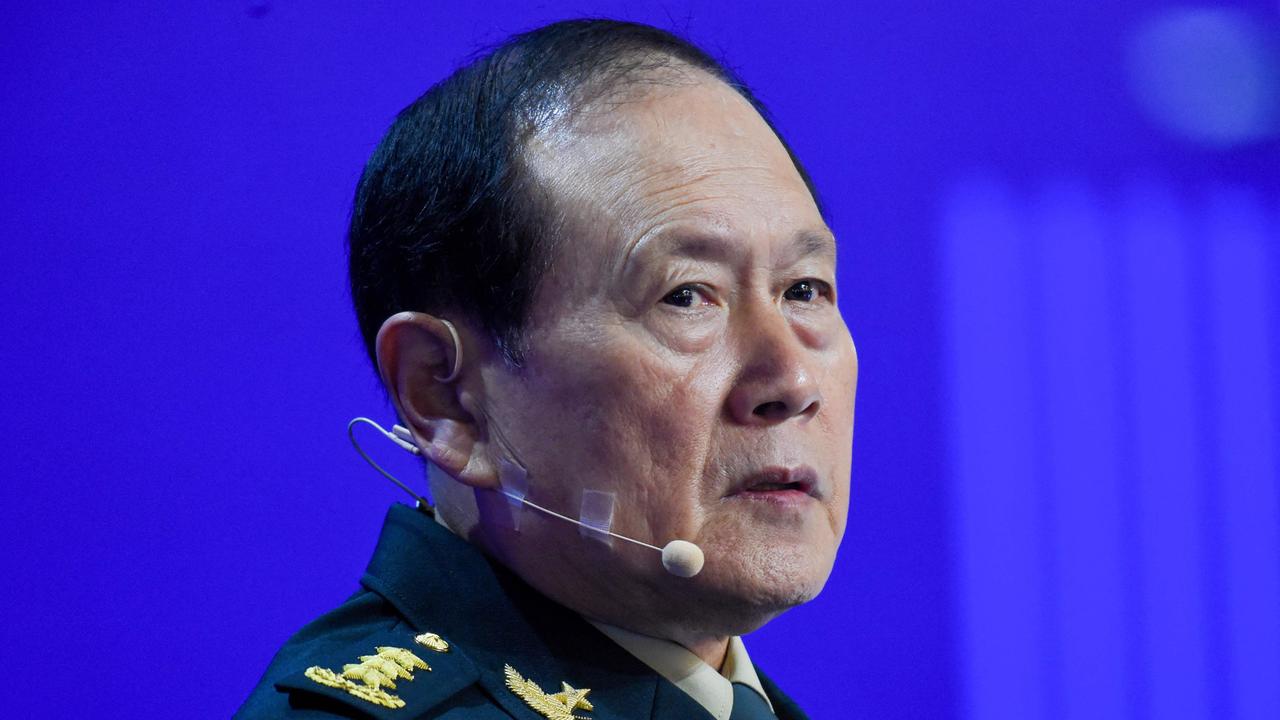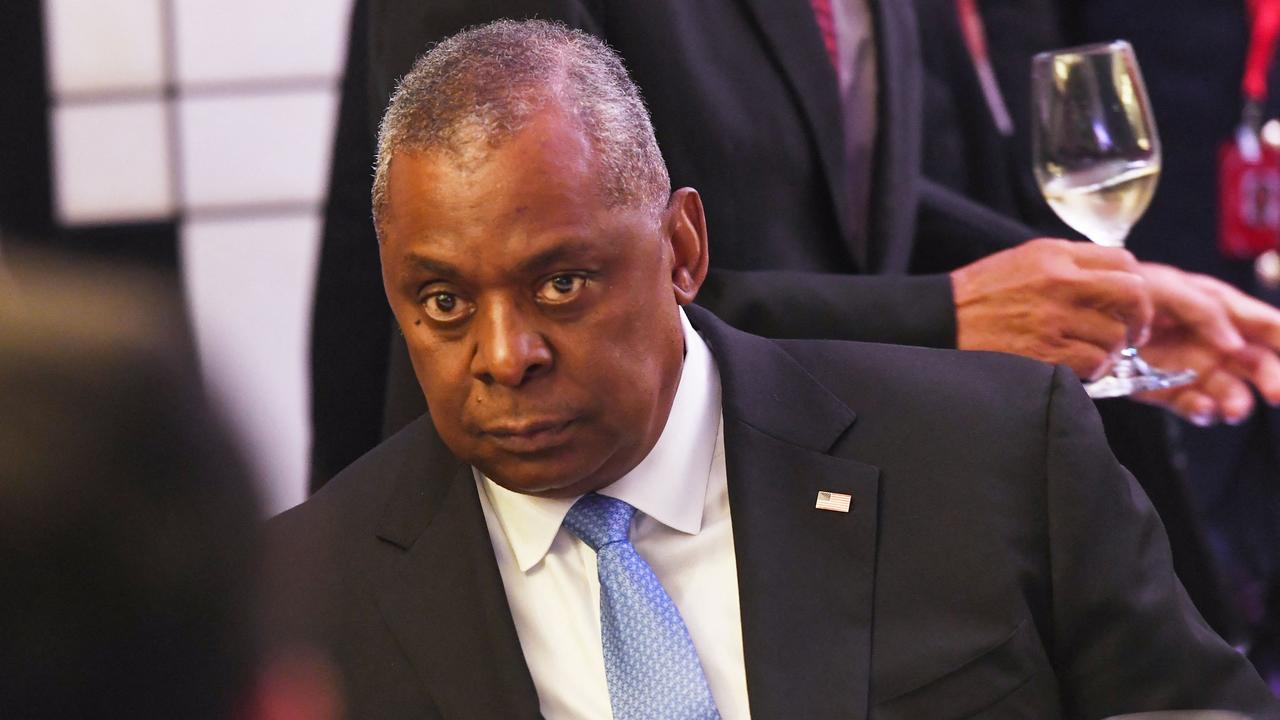China goes to peace dialogue with all guns blazing, shares fury at US
China’s Defence Minister has revealed Beijing has put a line in the sand when it comes to South China Sea, with an ominous promise.
“We will fight at all costs, and we will fight to the very end … This is the only choice for China.”
Beijing’s Defence Minister has laid a line in the sand – opposing any effort to stand up to China’s intimidation in Southeast Asia and beyond.
“We request the US side to stop smearing and containing China,” General Wei Fenghe intoned to a room full of his counterparts in Singapore at the weekend.
Regional defence ministers had gathered for the Shangri-La Dialogue defence summit for the first time in two years.
They came amid ever-escalating tensions between China and India over the Himalayas, China, Vietnam and the Philippines over the Paracel and Spratly Islands, and China and Japan over the Senkaku Islands.
Many summit attendees had hoped General Wei would flesh out Chairman Xi Jinping’s vision for a grand new world order “with Chinese characteristics” – dubbed the Global Security Initiative.
What they saw is what they get.
The world “should view China’s development and growth in a rational way, and refrain from attacking, smearing, containing and suppressing China. It must neither interfere in China’s internal affairs nor harm China’s interests,” General Wei declared.
Stream more world news live & on demand with Flash. 25+ news channels in 1 place. New to Flash? Try 1 month free. Offer ends October 31, 2022 >

Great powers, great responsibility
United States Secretary of Defence Lloyd Austin voiced the concerns several Southeast nations were reluctant to express for fear of Chinese retribution.
“We seek a region free of aggression and bullying,” he said. “And we seek a world that respects territorial integrity and political independence, a world that expands human rights and human dignity, and a world in which all countries – large and small – are free to thrive and to lawfully pursue their interests, free from coercion and intimidation.”
He pointed to ongoing efforts by China’s maritime militia fishing fleets to push Filipino fishers out of the Spratly Islands and Scarborough Shoal in the South China Sea.
He pointed to similar efforts to intimidate Japan around the disputed Senkaku Islands in the East China Sea.
He pointed to Beijing’s increasingly hostile talk of dominating the last holdout against Communism from the 1949 Chinese Revolution – Taiwan.
“We’ve also seen an alarming increase in the number of unsafe aerial intercepts and confrontations at sea by PLA aircraft and vessels,” Mr Austin said.
“In February, a PLA Navy ship directed a laser at an Australian P-8 maritime patrol aircraft, seriously endangering everyone on board. And in the past few weeks, PLA fighters have conducted a series of dangerous intercepts of allied aircraft operating lawfully in the East China and the South China Seas. Now this should worry us all.”
A second incident involving an Australian surveillance plane recently occurred over international waters. “The freedom of navigation in the South China Sea has never been a problem,” insisted General Wei.
But Mr Austin said the US and its allies would continue to fly, sail and operate in Southeast Asia’s international waters – just as they have done for decades.
“Our policy is unchanged and unwavering. It has been consistent across administrations. And we’re determined to uphold the status quo that has served this region so well for so long,” he said.

No surrender, no retreat
“If anyone dares to split Taiwan from China, the Chinese army will definitely not hesitate to start a war no matter the cost,” declared Chinese defence ministry spokesman Wu Qian.
But Taiwan is already split.
It never surrendered to Communist revolutionaries.
Now an entrenched democracy, it has its own ideas as to what its future should entail.
Mr Austin said Washington did not support Taiwan’s independence. But he stated, “we categorically oppose any unilateral changes to the status quo from either side”.
And that, he said, invoked the need for the US to continue assisting Taiwan in preparing to resist a hostile takeover.
“So our policy hasn’t changed. But unfortunately, that doesn’t seem to be true for the PRC,” Mr Austin said.
China has been rapidly modernising and expanding its military. And it’s using this to expand its influence in the region.
“It recently signed a security agreement with the Solomon Islands, which, according to leaked documentation, could lead to a Chinese naval base in the South Pacific. And last week, it broke ground on a port expansion project in Cambodia, alongside a Chinese-built airport, that could give Beijing a springboard into Southeast Asia.
China’s deputy chief of the Joint Staff Department, Zhang Zhenzhong, was also attending the Shangri-La Dialogue.
Like General Wei, he came out all guns blazing.
“The Indo-Pacific Strategy is designed to trap the Asia-Pacific region into a geopolitical game and confrontation as it tries to form a small circle by roping in some countries to incite against others,” the state-controlled Global Times reports him as saying.
“It seriously impacts the ASEAN-centred regional co-operation architecture and seriously harms the overall and long-term interests of countries in the region.”
But ASEAN nations are experiencing both sides of the great power struggle.
Chinese militia and coastguard vessels are ignoring their territorial sovereignty – far beyond the arbitrary “nine dash line” claim over the South China Sea.
Conflict of interests
More Coverage
General Wei blamed Washington’s diplomacy for regional tensions. “It is a strategy to create conflict and confrontation, to contain and encircle others,” he said.
“We must say no to exclusive blocs, confrontation, containment, decoupling and supply disruption. Building a high wall around one’s turf and forming parallel systems can only split the world and undermine the shared interests of all countries.”
Jamie Seidel is a freelance writer | @JamieSeidel






